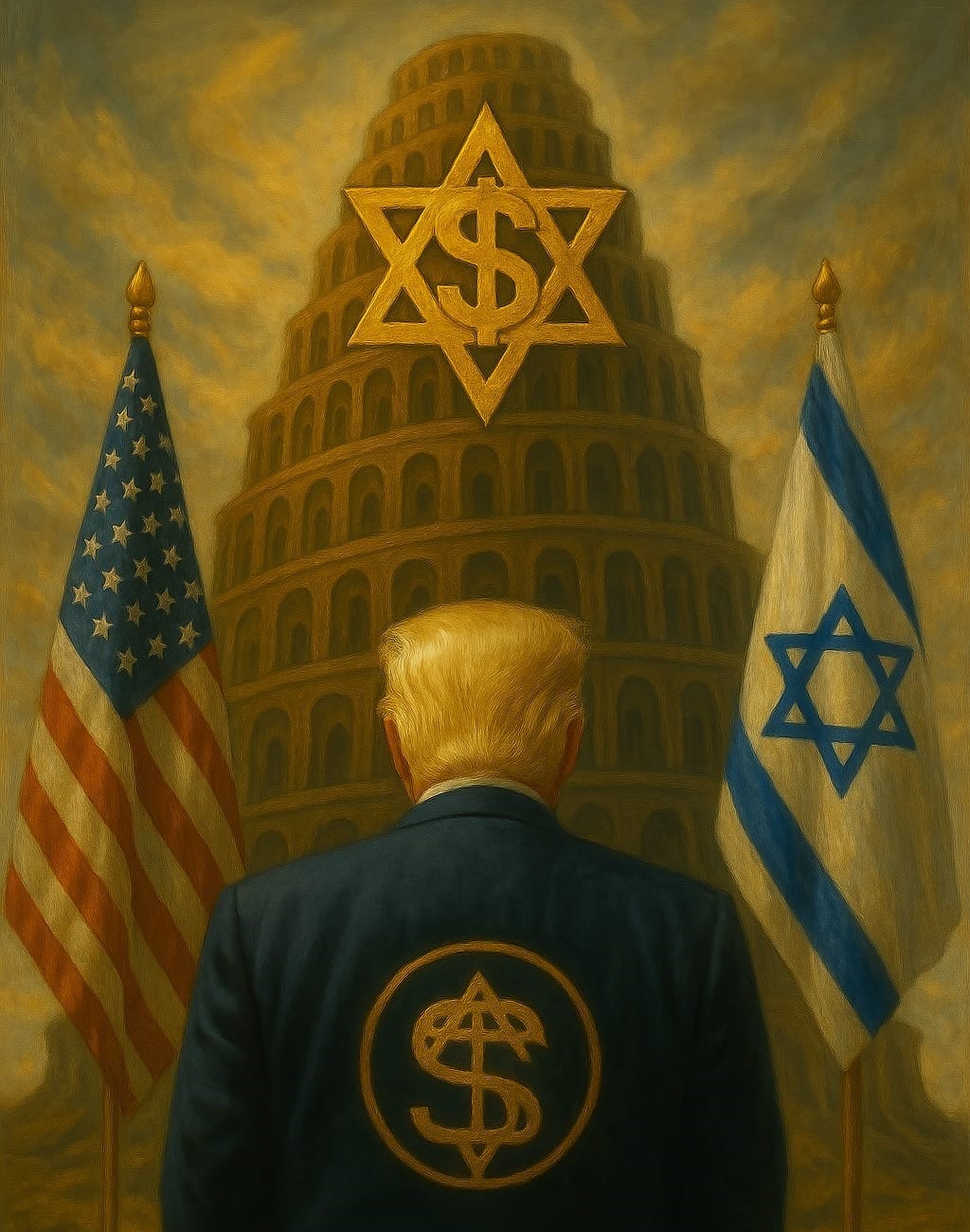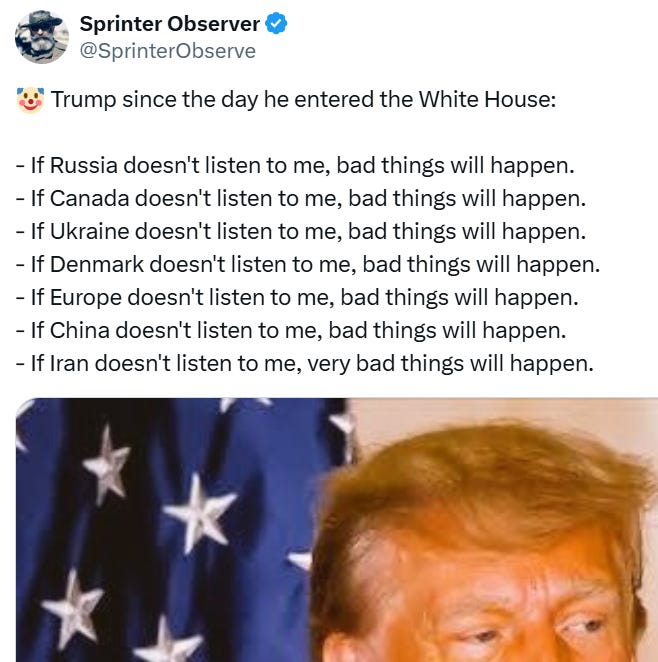Trump Foreign Policy is More Hubris, Ignorance and Imperialism
By looking more at the content and less at the form, the difference between Trump and previous presidents suddenly doesn't look so stark.
What to make of Trump’s foreign policy? It’s been a couple of months since Trump was inaugurated and it should now be possible to draw some conclusions.
It is important to focus on the actions of Trump and his administration, not the words coming out of the president’s mouth. It has become clearer to the media and to foreign leaders that what Trump says cannot be taken at face value, either because he is uninformed or because he is lying and making things up. Such communication may work for a while, but eventually it will lead to a lack of credibility and will start to drain his authority as US president. Any position of authority can be strengthened or weakened by charisma and personality, but also on the integrity and sincerity of the person filling that position.
Two Views of Trump Foreign Policy
With that said, what is Trump all about, internationally? Many analysts are wondering. There is no clear agreement yet, but there are dual views of Trump’s foreign policy, represented more or less clearly by different analysts. The two main positions are the following:
The first view, which can be called Onward towards Hegemony, is the one according to which, to quote analyst Julian Macfarland: “Trump is continuing the same course toward the US domination of the world. Trump is simply the same wolf in new clothing.”
This is the idea that the Trump administration may be blundering and incompetent at times in foreign policy matters, which is not unusual for new US administrations, but that is still bent on hegemony and trying to get Washington once and for all at the center a unipolar world.
The second view, which can be called Something is Hidden, and was expressed as following by analyst Gilbert Doctorow: “Trump is involved in a titanic struggle to cut down the deep state and to end those forces within the American institutions that have been promoting war globally, and a cold war with Russia and with China. This means that he has a great many enemies, and he is using confusion as a tool to neutralize his enemies.”
This second view is of course more optimistic if the goal is to get rid of the nefarious influence of the US Federal Government both in the US and around the world. It is thus the view that Trump’s seeming contradictions and erratic behavior are calculated and are meant to sow confusion, for the good of the MAGA people and of all of humanity.
There are many signs that the first view is correct, as the below sections will try to show.
Imperialistic Bipartisan Hubris
Considering Trump’s repeatedly hostile attitude towards China and menacing stance against Iran, and his rabid economic war un;eashed on any nation daring to undermine the position of the dollar as a basis for US power, as well as his disdain and disregard for international law, the UN and the WTO, he is clearly exhibiting the same imperialistic tendencies as previous US presidents and administrations.
This bipartisan nature of current US foreign policy has become obvious. For instance, criticism of Trump has been muted in Congress and in the biased Democrat-leaning MSM, even after Trump’s outrageous comments against Canada, Greenland and Gaza. This suggests a tacit agreement more widely from the Washington foreign policy establishment and military-industrial complex.
As the brilliant independent journalist Max Blumenthal recently said in one of his podcasts, that what “Trump administration is showing is continuity or escalation depending on the case, but no real change. Trump’s policies reflect continuity and escalation of traditional US imperial strategies, with a focus on Europe, Latin American and the Middle East.” And analyst Col. MacGregor recently said, “Trump does not have a coherent foreign policy and has not divorced himself entirely from the establishment in Washington as represented by the previous administration”.
Tucker Carlson’s recent interview with Steve Witkoff - Trump’s friend, mediator and ambassador-at-arge - was instructive in understanding Trump’s foreign policy. Listening to him it became clear that behind the nice words, it is still based on the US as the world's policeman. Witkoff pretends (or sincerely believes) that he (and the US) is a neutral and detached mediator in two serious conflicts, in which the US is strongly supporting one side militarily, and even instigated one of them. He goes on to explains that US is ready to engage in military action in order to prevent war... It doesn't get more Orwellian than that, when "war is peace."
Zionist to the Core
The Witkoff interview also makes clear that the Israel lobby continues to have an iron grip on US foreign policy. As Larry Johnson wrote, “Witkoff has a selective moral compass and it oriented totally in favor of Israel.”
Trump’s strongly pro-Israel position has become clear after he endorsed the bombing of Gazan civilian population after first brokering a ceasefire which he let Netanyahu break. As journalist Isabel Fiorelli posted:
Trump is clearly under the thumb of the AIPAC, which is perhaps the single greatest cause of the immense suffering of the Palestinian people.
Further, to help Israel he has ordered the bombing of the Houthis in Yemen, which is the typical US approach of inefficiently shooting first with innocent death as collateral damage, but with little to no strategic or even tactical results.
Peace with Russia ASAP
Many are saying Trump’s attitude towards Russia shows a new US acceptance of multipolarity and a willingness to cooperate with former adversaries. However, the Annual Threat Assessment 2025 of the US Intelligence Community that just came out is not very different from previous years. It is a political document from the US Deep State, giving a distorted picture of the “threats” and as usual putting all culpability on US “adversaries”. However, regarding Russia a key sentence stands out:
“Russia retains momentum as a grinding war of attrition plays to Russia’s military advantages. This grinding war of attrition will lead to a gradual but steady erosion of Kyiv’s position on the battlefield, regardless of any U.S. or allied attempts to impose new and greater costs on Moscow.”
This revealing assessement means that the US establishment is concluding that Russia will win the war on the battlefield unless a negotiated settlement can be found as soon as possible, and that there is nothing the US (and the West) can do about it.
This is the one key reason why the Intelligence Community and the political “opposition” in the US supports the Trump administration’s urgent but clumsy efforts to find a negotiated settlement with Russia. The second reason is the Trump’s willingness to confront China - like Obama - in view of the possibility of engaging military with the Middle Kindgom over Taiwan, as demented as that sounds.
Ignorance and Incompetence all Most Areas
The amateurism coming out of the White House and more generally from the current Administration has been simply staggering. This is not new, of course, for Washington DC with regards to foreign policy.
Regarding the Ukraine war, Trump thought, and publicly stated, that he would end the Ukraine war in 24 hours, even if this may have been just an election promise never meant to be fulfilled. Then, after a first meeting with the Russians, Marco Rubio, Trump’s Secretary of State, naively and publicly hoped that Russia would accept a 30 day general ceasefire, without any negotiations, when the Russians hold all the cards! As Yves Smith wrote,
Because the Trump Administration has no clear idea of what it wants in terms of a Ukraine end game, save being able to claim that Trump ended the war and is therefore a great deal-maker, it is at serious risk of falling into the behavior Sun Tsu warned about: “All tactics and no strategy is the noise before the defeat.”
Further incompetence was on display in the disclosure of the juvenile discussion of US war plans in a signal chat group, in which an anti-Trump reporter was (inadvertently?) invited. Not only will the bombing Yemen not stop the Houthis, something which is obvious after years of the Saudis trying just that. But to discuss it all in a childish way in a commercial chatroom is simply idiotic. This is why economist Jeffrey Sachs called the current moment in US foreign policy, an “amateur hour.”
As analyst Larry Johnson wrote, the interview with Witkoff also showed significant ignorance. “He revealed a surprising depth of ignorance about the situation in Gaza and the war in Ukraine” He comes across, not surprisingly, as someone who sees the world… as a New York Real Estate mogul would see the world, not grasping the multilayered interests of the involved players and the indirect consequences of US actions.
Further, to initiate a trade with on China is simply moronic and shows a stunning lack of insight into the Chinese economy, as several people have shown, like Secretary Bessent and Secretary Lutnick, not to mention JD Vance and Trump himself. And how can such commercial policies be justified in terms of “MAGA” since prices will go up, shelves might even be empty soon, but subtitute industries will not simply materialize out of thin air and at best would take a decade to implement? At a minimum, there would need to be an industrial policy put in place over decades to replace China’s industrial production to the USA. Nothing of the sort exists, it seems; only a blind and idiotic reliance on tariffs alone.
Same Old Same Old
All the above points to a US foreign policy under Trump that unfortunately is “same old same old”. It is a mostly bipartisan foreign policy that often is haphazadly thought through. It is also staunchly pro-Israel and infused with the familiar disdain for international law of previous administrations of the last 30 years.
On the surface, the Trump foreign policy consists of crude loud threats, yet in action is far more indecisive, and imbued by typical naive American optimism. The style is indeed very different compared to the Biden administration’s, giving to all those not paying attention the impression of a new US relationship with the world. But just as contrasted was Bill Clinton’s style compared to Bush 41’s, and Obama’s compared Bush 43’s.
Yet, all these administrations were convinced, like the current one, of the exceptionalism of the United States and its Manifest Destiny in world affairs. They acted accordingly, to the woe of many parts of the world. Trump’s foreign policy can thus indeed be described as “Onward Toward Hegemony”, as difficult as this goal will now prove to be for Washington.









I would describe Trump’s foreign policy as “Onward Toward Ruin”